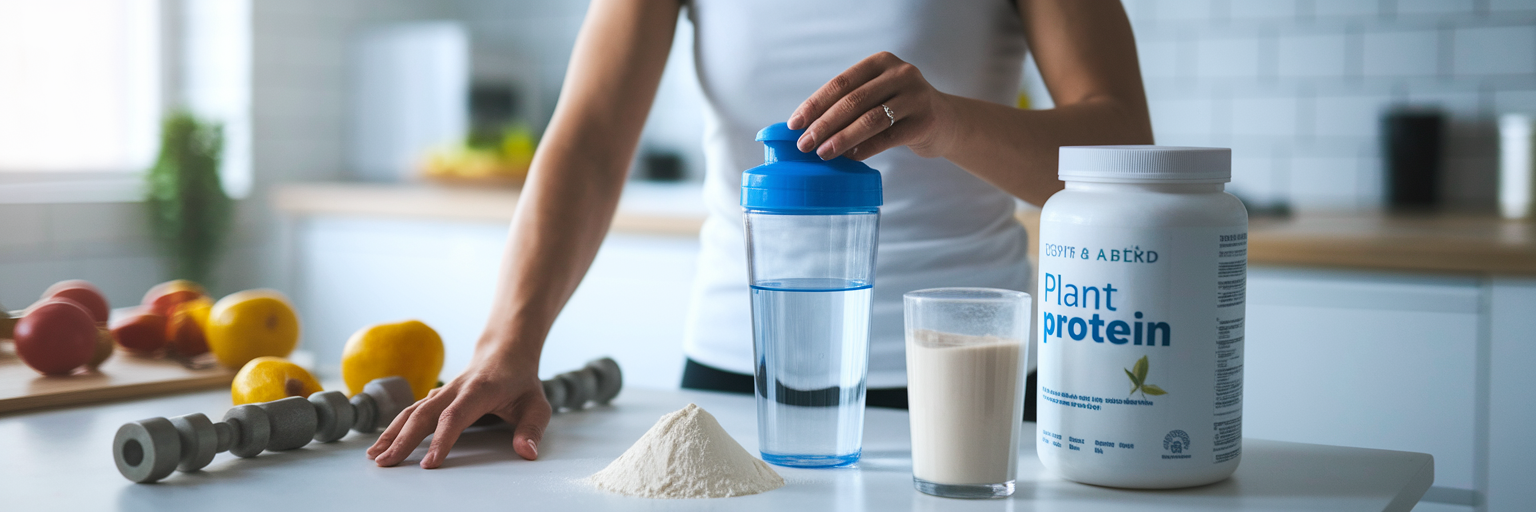The Power Couple for Plant-Based Muscle Building
When you're building muscle on a plant-based diet, you want every bit of effort to count. Think of your supplements working together like a well-oiled team. Vegan protein provides the essential amino acids, which are the construction materials needed to repair and build muscle tissue. But what if you could give your body a high-powered construction crew to make that work happen faster and more efficiently? That’s where creatine comes in.
Creatine’s primary job is to help regenerate ATP (adenosine triphosphate), your body's main energy currency for short, intense bursts of activity. During a tough set of squats or bench presses, your muscles burn through ATP rapidly. Creatine steps in to quickly replenish those energy stores, allowing you to push out an extra rep or two. That additional work is precisely the signal your body needs to initiate muscle protein synthesis, the process of building new muscle.
This is where the synergy of plant based protein and creatine truly shines. The creatine-fueled workout sends the command to build, and the vegan protein delivers the amino acids required to execute that command. Without enough protein, the signal goes unanswered. Without the intense workout, the protein has no new muscle to build.
There’s another benefit: cell volumization. Creatine encourages your muscle cells to draw in and hold more water. This isn't just temporary "water weight." This hydration creates a more anabolic, or muscle-building, environment within the cell itself. It signals the cell to swell, which can help increase protein synthesis and decrease protein breakdown. It’s a powerful combination that supports your hard work from multiple angles, helping you get more from every single training session.
Perfecting Your Dosage and Timing Strategy

Now that you understand how these two supplements work together, let's get practical. Knowing how much to take and when to take it makes all the difference in seeing consistent results. The good news is that the strategy is straightforward and easy to follow.
The Optional 'Loading Phase' for Quick Saturation
You might have heard about a creatine loading phase for vegans. This approach is designed to saturate your muscle stores as quickly as possible. The standard protocol involves taking 20 grams of creatine per day for 5 to 7 days, usually split into four 5-gram servings. This can help you experience the performance benefits faster. However, it's completely optional. You can achieve the same level of muscle saturation with a smaller daily dose over a longer period; the loading phase just accelerates the process.
The Standard 'Maintenance Phase' for Sustained Gains
Whether you choose to load or not, you will eventually transition to a maintenance phase. This is the most important part of your creatine strategy. For most people, a daily dose of 3 to 5 grams is all that’s needed to keep your muscle creatine stores full. The key here is consistency. Taking it every day, even on your rest days, ensures your muscles are always primed for performance and growth. Missing a day here and there isn't a disaster, but making it a daily habit is what delivers long-term benefits.
When to Take Your Supplements for the Best Results
When it comes to how to take creatine vegan style, timing is less critical than consistency, but there are some simple ways to optimize it. Some research suggests a small benefit to taking creatine shortly before or after your workout, as your muscles may be more receptive to nutrient uptake during this window. A simple and effective method is to mix your daily 3-5 gram serving directly into your post-workout protein shake. It mixes perfectly into a shake with a scoop of our Chocolate Vegan Protein, helping you replenish energy and deliver building blocks to your muscles at the same time. On rest days, just take it whenever is most convenient, like in a morning smoothie or simply with water.
| Strategy | Daily Dosage | Primary Goal | Best For |
|---|---|---|---|
| Loading Phase | 20 grams (split into 4 doses) for 5-7 days | Rapidly saturate muscle creatine stores | Individuals wanting the fastest possible results |
| Maintenance Phase | 3-5 grams daily | Maintain full muscle creatine stores | Long-term, consistent use for sustained benefits |
| Combined Approach | Loading phase followed by maintenance phase | Get fast results and then sustain them | The most common and effective method for most people |
This table outlines the two primary dosing strategies for creatine. While the loading phase is optional, it accelerates muscle saturation, with the maintenance dose being essential for long-term benefits.
Why Creatine Is a Game-Changer for Vegans
While creatine is beneficial for any athlete, it can be especially impactful for those on a plant-based diet. The reason is simple: dietary sources of creatine are found almost exclusively in animal products like red meat and fish. While omnivores get a small amount of creatine from their food, vegan diets contain virtually none. This means that vegans and vegetarians typically have lower baseline levels of creatine stored in their muscles.
Because of this lower starting point, supplementation isn't just an enhancement; it's filling a significant nutritional gap. This is why many vegans report more noticeable improvements in strength, power, and workout capacity once they start taking creatine. You're not just topping off the tank; you're filling it up from a lower level, which can lead to more pronounced results. This makes vegan creatine for muscle growth an incredibly effective tool.
The benefits aren't limited to the gym, either. Your brain is a high-energy organ that also relies on creatine. As the Mayo Clinic notes, individuals with lower baseline levels of creatine, such as vegetarians, may see significant cognitive benefits from supplementation, including support for memory and reasoning. And rest assured, you don't need to worry about the source. All commercially available creatine is synthesized from non-animal raw materials, making it 100% vegan-friendly. These amplified physical benefits are just one part of the story, as creatine offers a wide range of advantages.
Debunking Common Creatine Myths

Despite being one of the most researched supplements on the planet, creatine is still surrounded by myths. Let's clear the air so you can feel confident about adding it to your routine.
- Myth: Creatine damages your kidneys. This is the most persistent myth, but it's not supported by science. According to the Cleveland Clinic, extensive studies show that creatine is safe for healthy individuals when taken at recommended doses. The confusion often arises because creatine can slightly raise creatinine levels in the blood, a marker used to screen for kidney issues. However, this increase is expected and not a sign of harm.
- Myth: Creatine makes you gain fat. Creatine is calorie-free and does not cause fat gain. It does, however, cause your muscles to hold more water. This initial weight gain is from water inside your muscle cells (cell volumization), which is a positive sign that the supplement is working. It contributes to a fuller, more muscular look, not a softer one.
- Myth: Creatine is only for elite bodybuilders. Absolutely not. Anyone engaged in resistance training or activities involving short bursts of power can benefit. If you want to improve the quality of your workouts, lift a little heavier, or squeeze out an extra rep, creatine can help. It's one of the best vegan muscle building supplements for everyday fitness enthusiasts looking for a reliable edge.
- Myth: You need to cycle on and off creatine. This idea is outdated and generally applies to other types of supplements. For creatine monohydrate, there is no scientific evidence suggesting a need to cycle. Continuous use at a maintenance dose is safe and effective for maintaining saturated muscle stores.
Now that we've cleared that up, you can feel confident adding a high-quality creatine monohydrate to your routine.
Building Your Plant-Powered Foundation
Combining vegan protein and creatine is a smart, science-backed strategy for maximizing your muscle-building potential. It’s a simple yet powerful stack that supports your body’s natural processes for energy and repair. Let's quickly recap the main takeaways:
- Creatine boosts energy for more intense workouts, signaling your body to build muscle.
- Vegan protein provides the building blocks (amino acids) needed to repair and grow that muscle.
- Consistency is everything. A daily 3-5 gram maintenance dose of creatine is key for long-term results.
- It's safe and especially helpful for vegans, who don't get creatine from their diet.
Remember, supplements are designed to support a solid foundation. They work best when combined with consistent training, balanced nutrition, and adequate rest. They don't replace the hard work, but they can certainly make it more rewarding.
Ready to power up your workouts? Explore our full range of high-quality, certified vegan bodybuilding supplements US to find the perfect fit for your goals. And if you need some inspiration for that post-workout shake, check out these 3 easy vegan protein recipes you'll actually crave. If this guide was helpful, feel free to share it with a friend!



